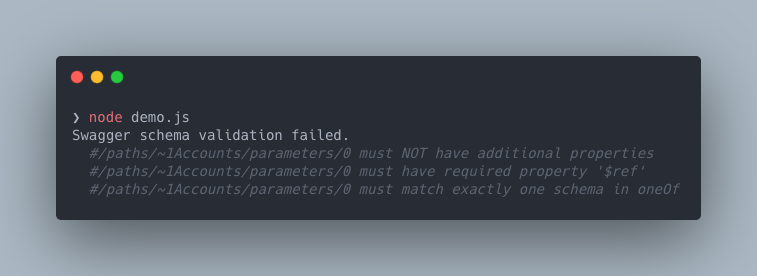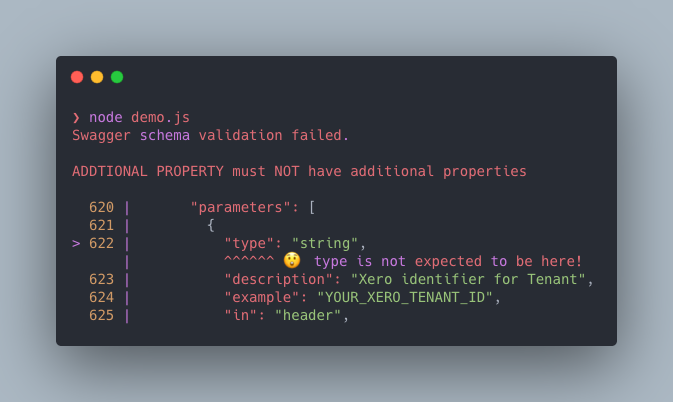- Parses Swagger specs in JSON or YAML format
- Validates against the Swagger 2.0 schema, OpenAPI 3.0 Schema, or OpenAPI 3.1 Schema
- Resolves all
$refpointers, including external files and URLs - Can bundle all your Swagger files into a single file that only has internal
$refpointers - Can dereference all
$refpointers, giving you a normal JavaScript object that's easy to work with - Tested in Node.js and all modern web browsers on Mac, Windows, and Linux
- Tested on over 1,500 real-world APIs from Google, Microsoft, Facebook, Spotify, etc.
- Supports circular references, nested references, back-references, and cross-references
- Maintains object reference equality —
$refpointers to the same value always resolve to the same object instance
OpenAPIParser.validate(myAPI, (err, api) => {
if (err) {
console.error(err);
} else {
console.log('API name: %s, Version: %s', api.info.title, api.info.version);
}
});Or use async/await or Promise syntax instead. The following example is the same as above:
try {
let api = await OpenAPIParser.validate(myAPI);
console.log('API name: %s, Version: %s', api.info.title, api.info.version);
} catch (err) {
console.error(err);
}For more detailed examples, please see the API Documentation
Install using npm:
npm install @readme/openapi-parserWhen using Swagger Parser in Node.js apps, you'll probably want to use CommonJS syntax:
const OpenAPIParser = require('@readme/openapi-parser');When using a transpiler such as Babel or TypeScript, or a bundler such as Webpack or Rollup, you can use ECMAScript modules syntax instead:
import OpenAPIParser from '@readme/openapi-parser';@apidevtools/swagger-parser returns schema validation errors as the raw error stack from Ajv. For example:
To reduce the amount of potentially unnecessary noise that these JSON pointer errors provide, @readme/openapi-parser utilizes better-ajv-errors, along with some intelligent reduction logic, to only surface the errors that actually matter.
Additionally with these error reporting differences, this library ships with a validation.colorizeErrors option that will disable colorization within these prettified errors.
Swagger Parser supports recent versions of every major web browser. Older browsers may require Babel and/or polyfills.
To use Swagger Parser in a browser, you'll need to use a bundling tool such as Webpack, Rollup, Parcel, or Browserify. Some bundlers may require a bit of configuration, such as setting browser: true in rollup-plugin-resolve.
Full API documentation is available right here





